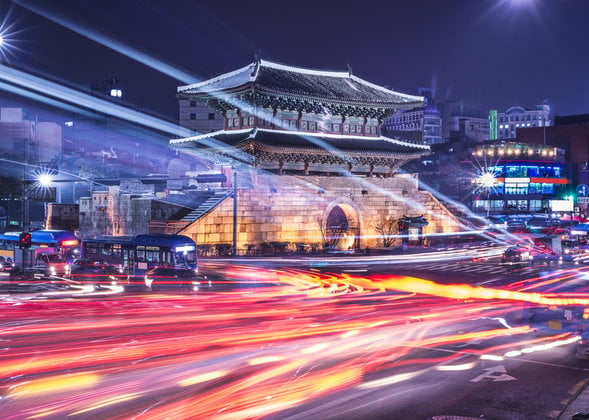2023 Government and Economic Development in South Korea

The South Korean economy has been going through one of the most significant changes since last 60 years. It began as a farming nation during the 1960s and it worked its way up to become the 13th most powerful economy in the world, concerning Gross Domestic Product (GDP) in 2022. What is the story behind this spectacular industrial development?
After the Korean War, international support became the most critical funding source for the rebuilding and restoration of the economic infrastructure. The leftovers of the industrial facility constructed by the Japanese, larger part of which (by the 1950s) was either extinct was ruined by war, was on the whole, had become a private ownership.
The owners were considered befitting more often for their political affiliation instead of their economic wisdom. Apart from this, government contracts were given to certain entrepreneurs and entities in return for funding aid of political ventures. This was the era in which a group of entrepreneurs launched businesses that went on to become the chaebols, or business conglomerates.
Seoul has reformed the industry to try to fuel productivity, support SMEs and boost the development of industrial contemporaries like health care, telecommunications and legal and financial services.
These Made South Korea an Economic Success
Quite a few studies give the credit of South Korea’s structural development to its political reforms, geared towards making the country accessible to overseas markets. Certainly, South Korea’s export-headed policies have a leading role in its success.
South Korea features among the top 10 exporting countries of the world and its exports in the form of a GDP percentage rose from 25.9% in 1995 to 56.3% in 2012. Two more factors have led to the rise of foreign economic activity and industrialization in South Korea:
- Better trading environment
- Policies offering investment for innovations
Economic System
The growth in South Korea has been better than the OECD average. In 2018, Korea registered a record high of current-account surpluses, indicating more international spirit of competition. The highlight is the country being a people-oriented economy that targets employment generation, income-motivated growth and welfare growth.
Major initiatives comprise the changeover of unstable employment contracts into permanent employment and a steady rise in the minimum wage. The government is also committed to overhaul South Korea’s trade economy by revamping the chief business conglomerates (chaebols).
While framing contracts, the main object was, self-regulation by the chaebols. Even after increasing interest rates in the United States, together with sound development and level of inflation, the Bank of Korea has been very vigilant in expanding interest rates by just 0.25% to 1.5% in November 2017.
With Korea’s reliance on exports for economic sustainability, the global trend and the crisis downturn in many developing economies are raising questions on the Korean economy.
Economic Programs
As labor-market transformation is the priority of the new regime, South Korea features in the higher-mid ranks (rank 15) as far as the economic policy is concerned. Its rating on this scale remains consistent, as compared to that in 2014.
Though the level of growth has been average but consistent over the last few years. Current account overflow has been high. The central bank has been careful about hiking interest rates.
The income-tax rate is high on high incomes, although the general taxable amount is reduced. Public debt is reasonable but growing in spite of health primary budget extras. R&D expenditure continues to be considerable, with the Moon government making investing heavily in essential technologies.
Budgets
South Korea’s public funds continue to be in great health, with a low national debt, as against many other OECD countries. National debt under the gross domestic product (GDP) was 40.4% in 2018, over 39.5% in 2017. For the term in sight, Korea had a good primary surplus of 1.3% of the GDP, enabling the government to plan to increase public investment and social expenditure. 2018 witnessed the biggest expansion in government budget in 10 years in a cool off of the global economy.
Taxes
In 2023, the South Korean tax regime continues to demonstrate efficiency in generating substantial government revenue, contributing to the country's sustained economic competitive edge. Notably, South Korea's tax rate remains one of the lowest among OECD countries, with tax revenues accounting for approximately 28.5% of the GDP in the most recent data. This robust revenue stream allows the government to fund various public initiatives, invest in key sectors, and maintain its position as a prominent player in the global economy.
As of 2023, South Korea's tax income has experienced a notable increase of 6.2% compared to the previous year, enabling the government to bolster public investments. Notably, the tax rate on taxable incomes exceeding KRW 500 million ($445,700) has been further adjusted and raised from 42% to 44% to support fiscal objectives and address economic priorities. These measures aim to strengthen the country's financial position and contribute to its overall economic growth.
An extra 25% corporate-income tax bracket was added for firms having taxable income of KRW 200 billion or higher. A drawback here is that the country’s tax base is relatively narrow, with almost 50% of the people free off income taxes because of the high exemption rate.
In December 2017, for ease of taxation, the European Union added South Korea to its black list of ‘non-cooperative jurisdictions,’ primarily due to ‘harmful preferential tax regimes’ inside the country’s special economic zones.
Following objections from Korea, the EU consequently moved Korea to its ‘grey list,’ comprising nations that have pledged for better cooperation.
Research, Improvement and Substructure
The South Korean government has big investments in research and development (R&D), specifically in areas that can be straightaway made commercial. The current government intends to integrate the policies that were fragmented earlier in the domain of R&D.
As of 2023, the budgetary allocation and plans for adjustments indicate a significant push for advancements in various technologies, particularly focusing on artificial intelligence (AI) and related fields. Notably, a substantial budget of KRW 1.2 trillion has been sanctioned for research and development (R&D) initiatives, representing a remarkable 25% increase compared to the funding in 2022.
This increased investment in R&D reflects the South Korean government's commitment to fostering innovation and staying at the forefront of technological advancements. By allocating substantial resources to these crucial sectors, the country aims to enhance its competitiveness on the global stage and foster economic growth through the development of cutting-edge technologies.
Korea has a superb research facility, with numerous world-class universities and research establishments that produce research and patents that can challenge the global competition. The oligopoly of Korea’s market hinders innovation. Due to this structure, businesspeople and SMEs do not find success easily. The country has worked hard to make huge investments in the domain of research, productive. Red tape on the other hand, still has presence in many areas.
Global Financial System
Although the Korean financial system has turned very robust since the 2008 crisis, risks continue to be a threat, specifically in terms of the country’s non-bank financial institutions (NBFIs).
Presently, South Korea has directed its international policies towards North Korea, and simultaneously boosting bilateral relations with the US and China, that rule the roost in this area. The Korean Government has, in the same way, lowered its emphasis on means of multilateral coordination, as, the G-20.
Conclusion
Since 2010, the Korean government has opened its doors to both, local as well as international investors, supplied them with all the support and a keen hearing for their ideas and suggestions. The Government’s outlook and policies have given the Republic economic stability and honest business environment, thereby making it a perfect place to do business.
Contact us for more information and help on doing and developing your business in South Korea.
.png?width=1656&height=121&name=rsz_%EB%A1%9C%EA%B3%A0%ED%88%AC%EB%AA%85%20(8).png)

